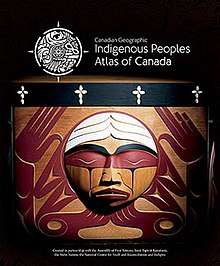Indigenous Peoples Atlas of Canada
 Cover of the volume Truth and Reconciliation, one of four books in the Atlas | |
| Country | Canada |
|---|---|
| Language | English, French |
| Subject | Indigenous peoples in Canada |
| Genre | Encyclopedia |
| Publisher | Canadian Geographic |
Publication date | 2018 |
| Website | Official website |
The Indigenous Peoples Atlas of Canada (French: Atlas des peuples autochthones du Canada) is an English and French[1] educational resource created by the Royal Canadian Geographical Society, published by Canadian Geographic, and funded by the Government of Canada.[2] It was created to address calls to action from the Truth and Reconciliation Commission, among them the development of "culturally appropriate curricula" for Aboriginal Canadian students.[2][3] Its content includes information about indigenous lands, languages, communities, treaties, and cultures, and topics such as the Canadian Indian residential school system, racism, and cultural appropriation.[4]
Description
The Atlas consists of a four-volume book set, an interactive website, five floor maps, downloadable tile maps, plastic-coated maps, poster maps, teaching guides for elementary and secondary school students, and lesson plans for teachers.[1][5] One floor map is the size of a school gymnasium.[6]
To create the Atlas, editors collaborated with a number of groups and organizations representing indigenous peoples in Canada, including the Assembly of First Nations, Indspire, Inuit Tapiriit Kanatami, the Métis National Council, and the National Centre for Truth and Reconciliation.[2] Some of the editors are members of an indigenous group.[4]
The four books comprising the encyclopedia are: Inuit, about the Inuit; Métis, about the Métis; First Nations, about the First Nations; and Truth and Reconciliation, about residential schools, redress, and litigation.[7] The latter volume also includes numerous maps.[7]
The visual design was created by Vincent Design of Winnipeg, founded by Métis designer Shaun Vincent.[7] The logo is a compass-shaped circular graphic representing guidance and incorporating themes from aboriginal groups throughout Canada, such as a medicine wheel.[7]
History
It was unveiled in Toronto in August 2018 by Royal Canadian Geographical Society chief operating officer Gilles Gagnier, Kids Can Press president Lisa Lyons Johnston, leaders of the Mississaugas of the New Credit First Nation, and some of the editors who contributed to the atlas.[2]
In June 2017, Mélanie Joly, the Minister of Canadian Heritage announced that the Government of Canada would provide $2,084,000 in funding to the Royal Canadian Geographical Society to develop the educational resource, a portion of which was drawn from the Canada 150 fund.[5] An issue of each of Canadian Geographic and Géographica were dedicated to the project.[5]
The book set will be sold and distributed by Kids Can Press.[8]
Notes
- 1 2 Canadian Geographic 2018.
- 1 2 3 4 Scott 2018.
- ↑ Calls to Action 2015, p. 2Point 10 states that there should be a commitment to sufficient funding for seven itemized principles, of which item 3 states "Developing culturally appropriate curricula"
- 1 2 Roy 2018.
- 1 2 3 Department of Canadian Heritage 2017.
- ↑ CBC News 2018.
- 1 2 3 4 Wheeler 2018.
- ↑ Royal Canadian Geographical Society 2018.
References
- Roy, Gabrielle (29 August 2018). "Indigenous Peoples Atlas of Canada launches after two years of input from communities". The Globe and Mail. The Canadian Press. Retrieved 30 August 2018.
- Scott, Katie (29 August 2018). "The launch of the Indigenous Peoples Atlas of Canada". Global News. Retrieved 30 August 2018.
- Wheeler, Brad (18 September 2018). "Mapping reconciliation: Canadian Geographic to debut Indigenous peoples atlas". The Globe and Mail. Retrieved 30 September 2018.
- "Atlas of Canada created by Indigenous people coming soon". CBC News. 2 September 2018. Retrieved 30 September 2018.
- "Coming soon: The Indigenous Peoples Atlas of Canada". Canadian Geographic. 26 February 2018.
- "Canada 150 Project to develop an indigenous-led educational tool" (Press release). Department of Canadian Heritage. 8 June 2017. Retrieved 30 August 2018.
- Royal Canadian Geographical Society (21 June 2018). "The Royal Canadian Geographical Society celebrates a Canadian first: The Indigenous Peoples Atlas of Canada" (Press release). Canada Newswire. Retrieved 30 August 2018.
- "Truth and Reconciliation Commission of Canada: Calls to Action" (PDF). Truth and Reconciliation Commission of Canada. 2015. Retrieved 30 August 2018.
See also
External links
- Official website
- Indigenous Peoples Atlas of Canada at CBC Radio "Calgary Eyeopener" (2 July 2018)
- New Indigenous Atlas of Canada at CBC Radio "Metro Morning" (29 August 2018)